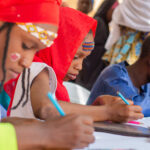World Menstrual Day is not just about acknowledging the biological process; it’s a day to recognise the challenges, taboos, and inequalities surrounding menstruation. For centuries, menstruation has been shrouded in stigma and shame, leading to discrimination and barriers for women and girls worldwide. However, in recent years, there has been a global movement to break the silence, empower women, and advocate for menstrual equity.
Breaking the Taboo
The taboo surrounding menstruation manifests in various ways across different cultures. In some societies, menstruating women are considered impure or even untouchable, leading to exclusion from daily activities, religious practices, and educational opportunities. This stigma perpetuates harmful myths and misconceptions, contributing to shame and low self-esteem among women and girls.
Education and Awareness
One of the most effective ways to combat menstrual stigma is through education and awareness. By providing accurate information about menstruation, its biological significance, and proper menstrual hygiene practices, we can empower women and girls to manage their periods with confidence and dignity. Schools, community centres, and healthcare facilities play a crucial role in disseminating this knowledge and fostering an environment of openness and understanding.
Access to Menstrual Products
Access to menstrual products is another critical aspect of menstrual equity. Many women and girls around the world lack access to affordable and hygienic menstrual products, forcing them to resort to unsanitary alternatives or miss out on essential activities during their periods. Governments, NGOs, and businesses must work together to ensure that menstrual products are accessible to all, regardless of socio-economic status.
Championing Menstrual Health
World Menstrual Day serves as a reminder of the importance of prioritising menstrual health as a fundamental human right. Governments should implement policies that address menstrual hygiene management in schools, workplaces, and public spaces. Furthermore, healthcare systems should provide comprehensive menstrual health services, including access to reproductive healthcare and support for menstrual disorders.
Empowering Women
Ultimately, empowering women on World Menstrual Day means challenging societal norms, advocating for policy change, and fostering a culture of inclusivity and respect. By amplifying the voices of women and girls, celebrating their resilience, and dismantling the barriers that hold them back, we can create a world where menstruation is no longer a source of shame or inequality. Together for a #periodfriendlyworld










